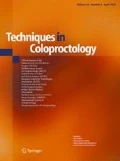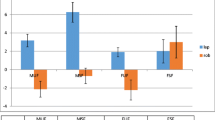Abstract
There have been conflicting opinions regarding the superiority of open and laparoscopic surgery in preserving bladder and sexual function after rectal cancer surgery. This systematic review and meta-analysis aims to pool the available data comparing the impact of surgical approaches on postoperative sexual and urinary function. A search of Pubmed, Medline, Cochrane and Embase was undertaken and studies from January 2000 to February 2013 were identified. We included, in our meta-analysis, both prospective and retrospective studies that compared laparoscopic surgery and open surgery for rectal cancer. A total of 876 patients undergoing rectal cancer surgery (lap n = 468, open n = 408) were examined. In men, postoperative ejaculatory function and erectile dysfunction evaluated from two studies comprising of 74 patients showed no difference between groups. The rate of overall sexual dysfunction evaluated from five studies comprising of 289 patients revealed a rate of 34 % in both the open and lap groups. Postoperative urinary function evaluated from five studies comprising of 312 patients showed no difference between groups. In women, postoperative sexual and urinary function were evaluated from five studies comprising of 321 patients. Three studies (n = 219) reported no difference in sexual function between groups. Postoperative urinary function evaluated from four studies comprising of 212 patients was found to be comparable. The available data are limited, but suggest that neither form of surgical approach be it laparoscopy or open surgery demonstrate superiority in preservation of sexual and bladder function. Further research into the technical aspects of surgery and evaluating newer minimally invasive technologies such as the robot may prove to be useful in improving functional outcomes of rectal cancer patients.







Similar content being viewed by others
References
Ho VP, Lee Y, Stein SL, Temple LK (2011) Sexual function after treatment for rectal cancer: a review. Dis Colon Rectum 54:113–125
Lindsey I, Guy RJ, Warren BF, Mortensen NJ (2000) Anatomy of Denonvilliers’ fascia and pelvic nerves, impotence, and implications for the colorectal surgeon. Br J Surg 87:1288–1299
Lindsey I, Mortensen NJ (2002) Iatrogenic impotence and rectal dissection. Br J Surg 89:1493–1494
Schmidt CE, Bestmann B, Kuchler T, Kremer B (2005) Factors influencing sexual function in patients with rectal cancer. International journal of impotence research. Int J Impot Res 17:231–238
Engel J, Kerr J, Schlesinger-Raab A, Eckel R, Sauer H, Holzel D (2003) Quality of life in rectal cancer patients: a four-year prospective study. Ann Surg 238:203–213
Traa MJ, De Vries J, Roukema JA, Den Oudsten BL (2012) Sexual (dys)function and the quality of sexual life in patients with colorectal cancer: a systematic review. Ann Oncol 23:19–27
Yang L, Yu YY, Zhou ZG et al (2007) Quality of life outcomes following laparoscopic total mesorectal excision for low rectal cancers: a clinical control study. Eur J Surg Oncol 33:575–579
Jayne DG, Brown JM, Thorpe H, Walker J, Quirke P, Guillou PJ (2005) Bladder and sexual function following resection for rectal cancer in a randomized clinical trial of laparoscopic versus open technique. Br J Surg 92:1124–1132
Jayne DG, Thorpe HC, Copeland J, Quirke P, Brown JM, Guillou PJ (2010) Five-year follow-up of the Medical Research Council CLASICC trial of laparoscopically assisted versus open surgery for colorectal cancer. Br J Surg 97:1638–1645
Quah HM, Jayne DG, Eu KW, Seow-Choen F (2002) Bladder and sexual dysfunction following laparoscopically assisted and conventional open mesorectal resection for cancer. Br J Surg 89:1551–1556
Asoglu O, Matlim T, Karanlik H, Atar M, Muslumanoglu M, Kapran Y, Igci A, Ozmen V, Kecer M, Parlak M (2009) Impact of laparoscopic surgery on bladder and sexual function after total mesorectal excision for rectal cancer. Surg Endosc 23(2):296–303. doi:10.1007/s00464-008-9870-7
McGlone ER, Khan O, Flashman K, Khan J, Parvaiz A (2012) Urogenital function following laparoscopic and open rectal cancer resection: a comparative study. Sur Endosc 26:2559–2565
McGlone ER, Khan OA, Conti J, Iqbal Z, Parvaiz A (2012) Functional outcomes following laparoscopic and open rectal resection for cancer. Int J Surg 10:305–309
Der Simonian R, Laird N (1986) Meta-analysis in clinical trials. Control Clin Trials 7:177–188
Stamopoulos P, Theodoropoulos GE, Papailiou J et al (2009) Prospective evaluation of sexual function after open and laparoscopic surgery for rectal cancer. Surg Endosc 23:2665–2674
Nitori N, Hasegawa H, Ishii Y, Endo T, Kitajima M, Kitagawa Y (2008) Sexual function in men with rectal and rectosigmoid cancer after laparoscopic and open surgery. Hepatogastroenterology 55:1304–1307
Rosen R, Brown C, Heiman J et al (2000) The Female Sexual Function Index (FSFI): a multidimensional self-report instrument for the assessment of female sexual function. J Sex Med 26:191–208
Kang S-B, Park JW, Jeong S-Y et al (2010) Open versus laparoscopic surgery for mid or low rectal cancer after neoadjuvant chemoradiotherapy (COREAN trial): short-term outcomes of an open-label randomised controlled trial. Lancet Oncol 11:637–645
WHO Expert Consultation (2004) Appropriate body-mass index for Asian populations and its implications for policy and intervention strategies. Lancet 363:157–163
Conflict of interest
None.
Author information
Authors and Affiliations
Corresponding author
Rights and permissions
About this article
Cite this article
Lim, R.S., Yang, T.X. & Chua, T.C. Postoperative bladder and sexual function in patients undergoing surgery for rectal cancer: a systematic review and meta-analysis of laparoscopic versus open resection of rectal cancer. Tech Coloproctol 18, 993–1002 (2014). https://doi.org/10.1007/s10151-014-1189-x
Received:
Accepted:
Published:
Issue Date:
DOI: https://doi.org/10.1007/s10151-014-1189-x




